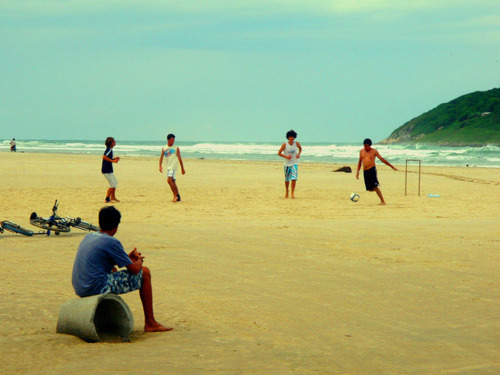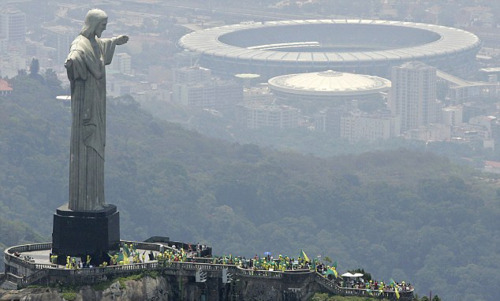The 2014 World Cup and It’s Price On Brazil
The 2014 World Cup and It’s Price On Brazil


As London gears up for the Olympics, voices of dissent regarding the costs of hosting the games are widespread. Across the Atlantic, the mood in Brazil ahead of the 2014 World Cup is not dissimilar.
As well as the all too familiar problem of construction delays there have been some more serious issues – issues of a humanitarian nature – for the government and tournament organisers to contend with. Tens of thousands of people have been forcibly removed from their homes as construction projects spring up across the country, putting in place the infrastructure required to cater for the hordes of fans who will flock to its shores in three years’ time and such incidents are just some of many contributory factors to the undercurrent of discontent emerging among the Brazilian public.
The systematic demolition of Brazil’s favela settlements is not a new phenomenon – the government has resorted to such measures on a number of occasions in recent decades, sometimes simply in order to ‘clean up’ their cities, sometimes in the hope of reducing urban crime and on one occasion in the hope of presenting a seemingly happier, friendlier and altogether more aesthetically pleasing Brazil for the visit of Pope John Paul II.
More recently; however, local and national initiatives have sought to accept that favelas are simply a part of Brazil’s urban landscape and rather than seeing them as undesirable blemishes, all efforts should be made to integrate them into the cities of which they form a vibrant and important part.
It is for this reason that the recent urban cleansing, as it were, has been greeted with such shock and hostility not only from the residents of the favelas but from the wider public. According to those campaigning on behalf of the evictees, as many as 1.5 million people may be forced to leave their homes – homes that in the majority of cases have been hand-built by their owners. Scattered reports also suggest that in several cases the housing developments built to accommodate the displaced families are suffering from delays, rendering thousands indefinitely homeless.

Worse still, even those communities fortunate enough to avoid demolition suffer from the after effects of displacements elsewhere. Amongst those forced out of their homes are drug addicts and, in some cases, the accompanying criminal gangs. With nowhere else to go, these groups often take up residence in the surrounding intact favelas at great social cost to the communities therein.
With limited political representation, and facing the juggernaut that is the organisation and presentation of a World Cup finals, there appears to be no hope of the favela residents delaying – let alone thwarting – what is effectively a programme of mass eviction of the lower classes set out in order to put on a glossy show for the rest of the world. Despite pressure from the likes of Amnesty International, left-leaning president Dilma Rousseff has thus far been muted on the matter despite vowing to eliminate dire poverty in the country. The impression one gets is that the issue is being pushed into the margins of mainstream political debate.
In addition to the social costs, the infrastructural developments will also leave Brazilian taxpayers with a considerable bill. As well as the construction and redevelopment of stadia, transport links are being completely overhauled and acres of land have been set aside for other projects targeted at the influx of tourists.
$11 billion has already been earmarked by the Brazilian government for spending on the World Cup and associated projects, and with Rio hosting the Olympics two years later, the size of the burden on the economy cannot be overstated. What’s more, while domestic revenues from the World Cup can be expected to match, if not surpass the costs, the Olympics, with their stringent regulations on corporate sponsorship and less lucrative nature in general, may not prove to be as financially forgiving.
Nevertheless, taking the World Cup in isolation, Brazil’s government can afford to be cautiously optimistic that the wealth it accrues over the course of the tournament will provide its economy with a welcome fillip. Much was made of the disparity in economic outcomes following South Africa’s World Cup with regards the nation in comparison to FIFA, with South Africa’s economy said to have been boosted by 0.5% through hosting the tournament while FIFA’s profits would have been greater than this, possibly as high as an equivalent of 0.7% of South African GDP. Such a comparison is relatively meaningless: however, as by profiting less than FIFA, South Africa does not lose out in any way – we are not comparing too equivalent parties here. The 0.5% boost toSouth Africa’s economy is just that, a boost. While it can – and certainly has been – argued that a good deal more of FIFA’s revenues should have been invested into South Africa, in the form of football development initiatives for example, it remains a fact that the hosts made a net financial benefit from the event.
There can be little doubt that Brazil has incurred significant social costs through its decision to host the World Cup, but in the capitalist society we occupy today it is hardly surprising that the promise of economic gain took precedent in the decision making process. It should also be remembered that what we are talking about here is the opportunity to host one of the greatest sporting events of the world. It may seem cynical to say so, but while the public may not be happy now, in three years’ time the explosion of positivity and pride that comes with hosting such an event will see such rumblings forgotten almost overnight. This is not to say I condone the suppression of a silenced minority to allow the financial and reputational gain of a nation, but merely an acknowledgement that such is the way of the world we live in.
John Burn-Murdoch’s writing can also be found at The Oval Log, which is full of fascinating reads. Comments below please.







